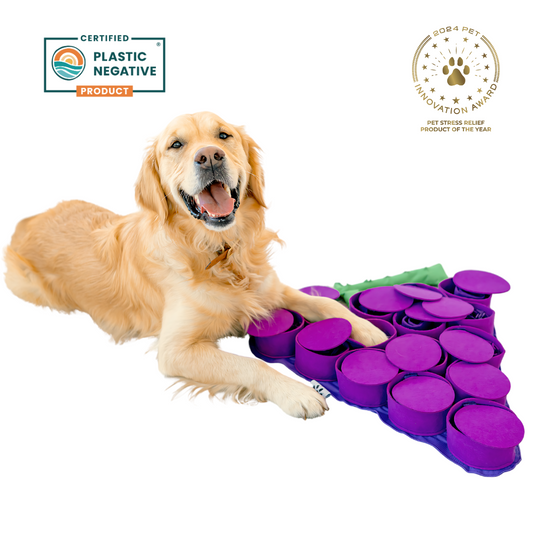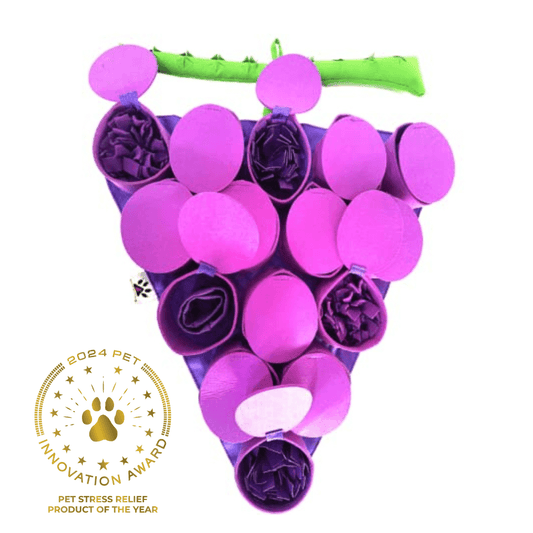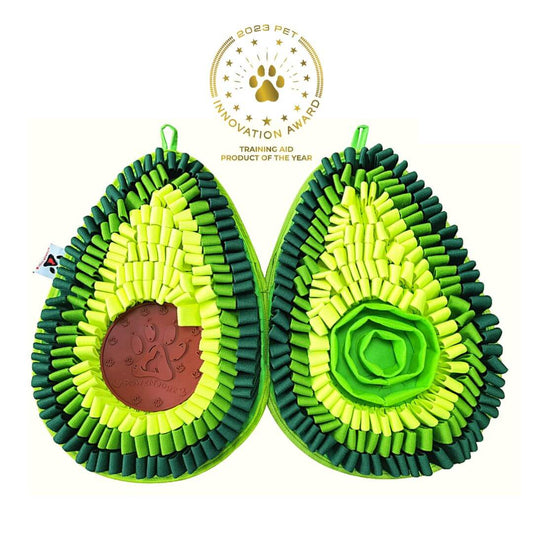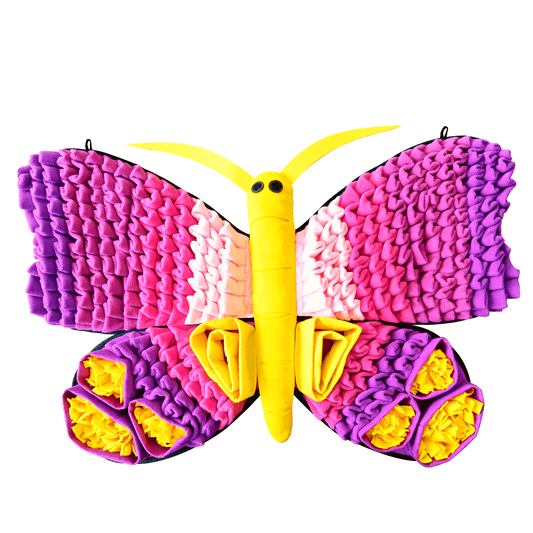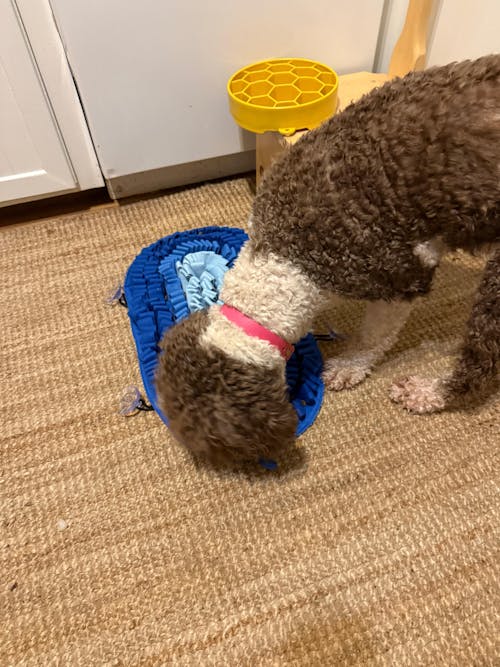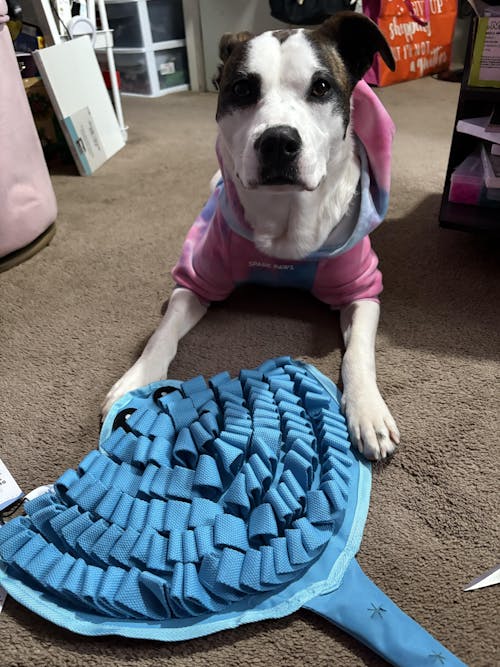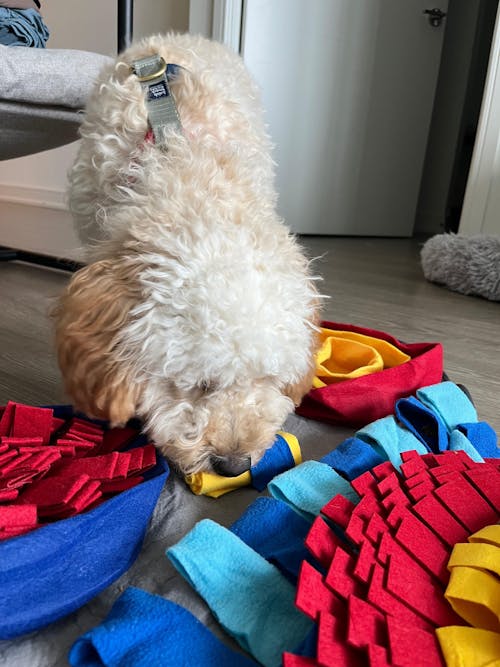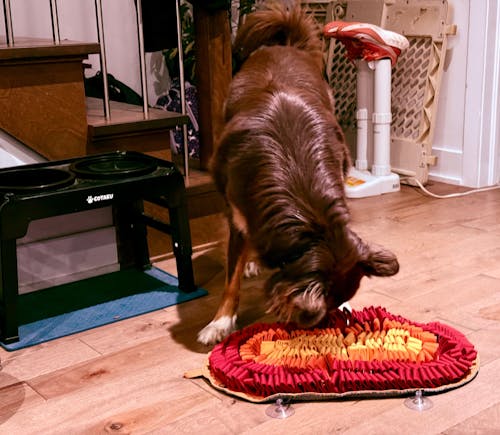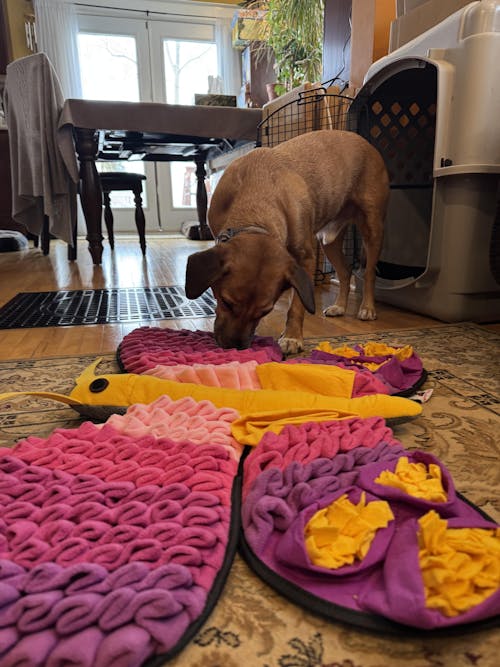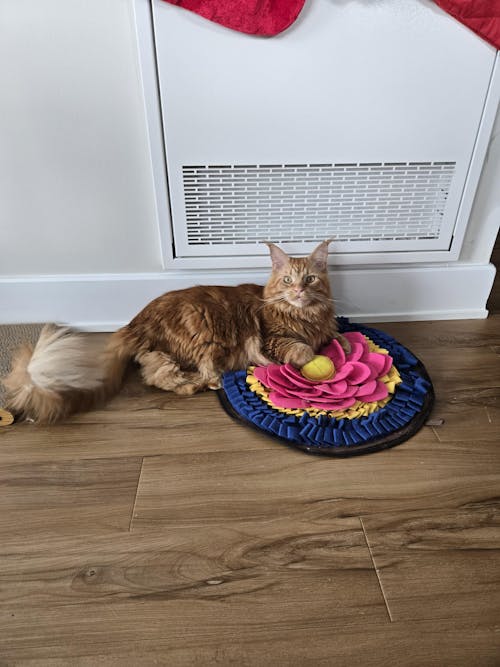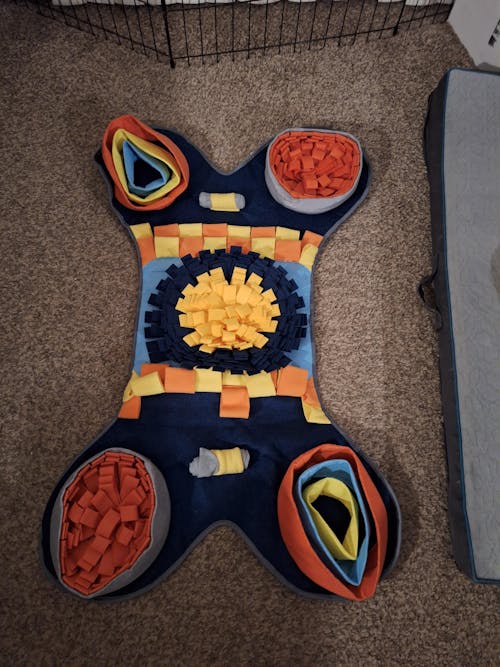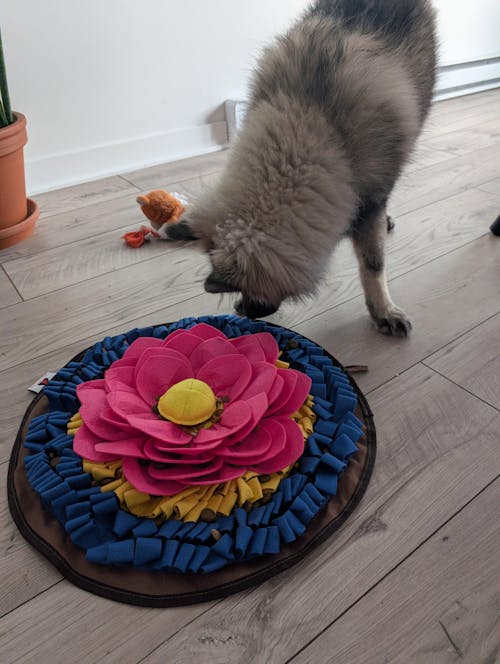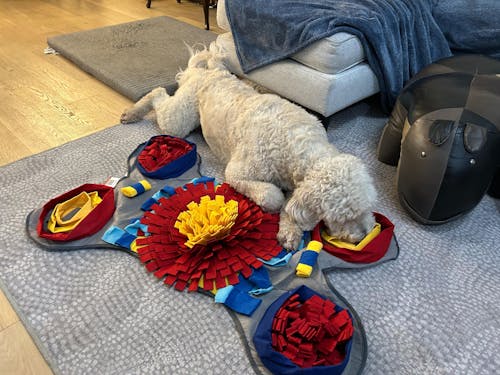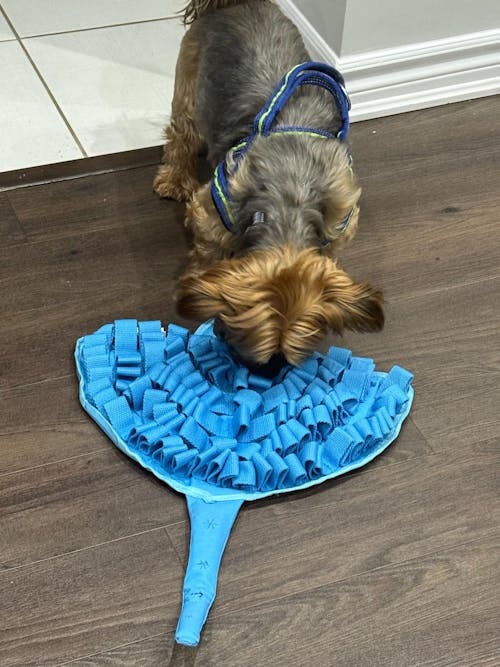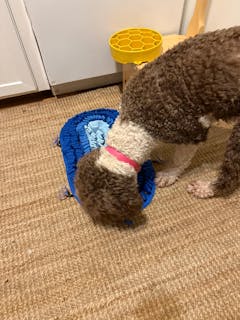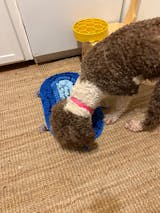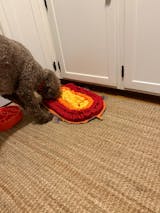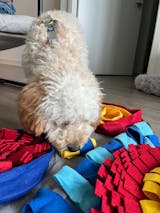Bringing a rescue and shelter pet into your home is an emotionally rewarding experience. However, sometimes it comes with uncertainty. Many rescue pets arrive from shelters feeling confused, anxious, or overwhelmed. You might notice them pacing, hiding, barking, freezing, or having difficulty settling down. They do not understand where they are, why things have changed, or what is expected of them.
This is where calm enrichment gives pets a chance to slow down. Activities with snuffle mats for dogs, cats and small pets provide emotional balance, helping them feel secure and comfortable.
Let's take a closer look at this blog and discover how a snuffle mat can create a big difference during a pet's adjustment period.
Behaviour Challenges in Rescue and Shelter Pets
When pets first enter a shelter or rescue, they are:
Anxious or unsure about new sounds and people.
Restless or even shut down.
Suffering from behaviour problems, like boredom or stress reactions.
How do calm and low-stress enrichment activities help?
Loud toys, fast games, or nonstop interaction may overwhelm pets rather than help. In contrast, calm enrichment activities like sniffing and searching allow pets to focus gently. This makes pets feel more in control of their world.
Understanding Behavioural Adjustment in Rescue & Shelter Environments
It takes time for pets, especially those from unpredictable backgrounds. They may have to learn new routines, spaces, and people all at once in rescue and shelter environments. This makes them feel scared and confused. However, the common stress responses and triggers are:
Loud noises and sudden movement.
Crowded spaces or kennels
New people handling food or toys
Fireworks, police sirens, and loud smoke alarms
That's why structured enrichment is often used for pets. Structured enrichment with mats provides a clear activity with a start, middle, and end, reducing emotional overload during transitions.
What Snuffle Mats Are and How They Work?
Snuffle mats, such as Juicy Hamburger, Hot Sushi Roll, and Sassy Stingray, are soft fabric mats that look simple but tap into powerful instincts. Pets spend much of their day searching for food. This behavior is deeply rooted and very comforting. Snuffle mats recreate this experience indoors, allowing pets to use their instincts naturally. Sniffing, a scent-based activity, also improves mental stimulation for dogs and other pets who struggle to settle or relax.
Behavioural Rehabilitation Goals: They Help Support
Rehabilitation is not about making pets act a certain way. It is about helping them feel safe so they can relax, learn, and explore their surroundings.
Confidence-building
Many rescue pets feel unsure in new situations. Snuffle mats give them small challenges to work for. Each time a pet finds a hidden treat, it is a win. These little wins slowly build confidence and help pets feel stronger.
Calm engagement and emotional regulation
Instead of reacting to every noise or movement, pets focus on one quiet task. This teaches them to relax and soothe themselves, especially after stressful times.
Mental stimulation without overstimulation
Some activities make pets too excited or energetic. Snuffle mats provide mental engagement without causing stress, keeping them busy yet calm. It is very important for sensitive animals. For best results, see how to train your dog to use a snuffle mat effectively.
When are Snuffle Mats commonly used in Shelters and Humane Societies?
Timing matters. So, snuffle mats work best in quiet moments, when pets are adjusting to change. Other settings where snuffle mats are commonly used include:
Intake and Decompression Periods
When pets first arrive at a shelter or new home, everything can feel overwhelming. A snuffle mat provides an easy, calming activity that helps them settle and feel more at ease.
Foster Care Adjustment
In foster homes, snuffle mats help pets learn daily routines at their own pace. It also lets caregivers see how a pet calmly solves small problems.
Pre-Post-Training Quiet Time
Pets need focus during training. Using a snuffle mat afterward helps them calm down and also with impulse control.
Mealtime enrichment routines
Using a snuffle mat instead of a bowl helps pets eat slowly, work their brains, and expend their energy to become calm during mealtime. This is especially useful for overweight pets, as it encourages gentle indoor activity while providing mental stimulation.
Safe and Considerate Use for Behaviour-Sensitive Pets
Some pets need time to adjust to new activities. Sensitive animals require extra care. Thus, introducing changes slowly helps them feel comfortable
Slow introduction and supervision
Pets may be unsure about a new mat. Let them sniff it without food first. Keep an eye on them so it stays safe and fun.
Session duration and comfort thresholds
Keep the activity short in the beginning. Stop while the pets are still focused, so it stays positive and fun.
Signs to pause or modify use
If a pet struggles, appears frustrated, or leaves, it indicates the activity is too difficult or too stimulating at that moment.
Step-by-Step Gentle Introduction Approach
A slow introduction helps pets enjoy the activity. Here’s a calm way to begin with a snuffle mat:
Initial easy exploration: Put treats on top of the mat so pets can find them easily. This helps them learn how the mat works without stress.
Gradual difficulty increase: Once pets are comfortable, place treats deeper in the mat. It keeps the game exciting but easy to handle.
Integration into predictable routines: Doing snuffle mat activities at a set time daily builds routine. Predictable schedules make them feel secure.
Using Snuffle Mats Alongside Behaviour Support Plans
Snuffle mats work best as part of a bigger picture. Here is how:
Positive reinforcement contexts
Snuffle mat time after calm behavior reinforces emotional balance. Therefore, pets learn that relaxed choices can lead to positive experiences.
Collaboration between shelters, fosters, and adopters
Pets experience consistency when shelters, fosters, and adopters use the mat the same way. This helps transitions feel easier and progress last longer.
Considerations for Different Pet Types
Every pet has its own emotional needs. Snuffle mats can adapt to it accordingly. Take a look at the considerations you should take into account for different pet types:
Anxious or fearful dogs: Snuffle mats for dogs help redirect nervous energy into slow, focused scent work. It supports relaxation and confidence among dogs.
High-energy but overstimulated pets: Pets who can’t settle use mental challenges to burn energy calmly. This keeps the focus on the pets and the action they’re doing.
Shy cats and small animals: A cat snuffle mat supports gentle exploration and cat enrichment without forcing interaction.
Foraging activities provide safe, natural mental stimulation for small pets.
Practical Guidelines for Shelters and Foster Homes
Enrichment needs to be well-managed in shared environments. You should follow the guidelines in the shelters and foster homes. These include:
Hygiene and rotation practices
Snuffle mats should be washed regularly to maintain hygiene. Rotating mats helps prevent boredom and overstimulation.
Storage and cleaning routines
Storing mats out of reach prevents unsupervised use and helps maintain their value as a special activity.
Enrichment scheduling
Planned enrichment ensures pets receive balanced stimulation while still getting enough rest.
Example Use Scenarios in Rehabilitation Settings
These everyday moments show how snuffle mats support recovery.
Intake decompression: A newly arrived dog stops pacing and begins to relax while working on a snuffle mat. It drops their stress levels.
Foster transition support: A foster pet uses the mat each evening. It helps them relax and get used to the household routine.
Post-adoption settling periods: During the first few days in a new home, snuffle mats give pets comfort and something familiar when everything else feels new.
Situations Where Snuffle Mats May Not Be Suitable
Snuffle mats are useful; however, they aren’t the right fit for every dog or situation. Here are the situations when snuffle mats might not be a suitable option.
Resource-guarding behaviour: Some pets that guard food might exhibit extreme responses to food-based enrichment. In these situations, structured help is necessary before introducing a snuffle mat to your pets.
Frustration or overstimulation: Pets can become frustrated or overstimulated. And if they do, just let them go and wait till they're ready to take the training again.
Medical or dietary considerations: If your dog has dental problems, allergies to anything, or a sensitive stomach, then you should be careful about what treats you introduce to them
Conclusion
Snuffle mats for dogs, cats and small pets offer gentle support during behaviour rehabilitation. Activities with Juicy Hamburger, Hot Sushi Roll, or Sassy Stingray snuffle mats calm, soothe, and help dogs feel more confident and secure during transitions.
But when used thoughtfully, snuffle mats provide enrichment. They offer rescue dogs a safe way to self-soothe and to start to trust their new world again.
Shop at PawzNDogz to explore these snuffle mats and bundles for your pets today! Also, explore why snuffle mats are the perfect holiday gift for pet owners.





















